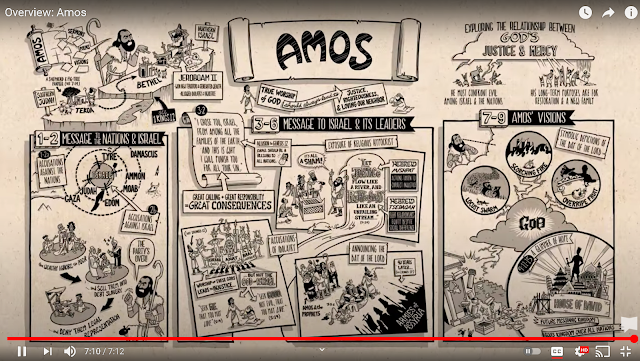It's been a good stay in Jonah, but after three weeks, I'm ready to move along. I finished Jack Abeelen and Alistair Begg's sermons on Jonah, in addition to the Bullock sections. I even re-read my 2014 thoughts on the book, which held up better than I feared. It's both comforting and scary that my realizations then and now have many similarities--comforting to know that I am thinking through things carefully in a way that is "checkable"--scary because I don't remember thinking all those thoughts before. I guess that's the wear and tear of seven years.
Before I leave Jonah though, I have a cache of unsorted truths worth corralling.
First, I'm thankful for God's great patience and pursuit of man. He makes a way for Adam and Eve, Cain, Noah. We see it with Abraham and Sodom, Jacob at Peniel, with Job, and yes, Jonah and the Ninevites as well. I see it in my life today as well as the lives of others. Jesus knew the heart of man, yet he wept over Jerusalem. Praise be to God for His care, His long suffering patience and endurance with us.
I'm also thankful that God allows mankind to wrestle with Him. He's not diminished or threatened by earnest, sincere questions, but willing to throw Himself in the ring with man's best attempts to reason. He is fully wise beyond our understanding, and won't permit us to limit His scope:
"The actions of God, in judgment and in mercy, are not constrained by our understanding of what’s taking place...."Says one Scottish theologian, “Ultimately divine grace towards sinners cannot be understood. It does not have a reason. It simply reflects the way God is.” -Alistair Begg
All the same, He's also willing to endure Jonah and Job's questions about His nature and intentions. He bothers to listen and answer. God is pleased to be sought after by any and all nations and people groups.
Pivoting To Address Today's Church
In this last sermon of his "Man Overboard" series, Alistair Begg bring the question out to the present, to today's church and our sometimes insular tendencies which are not far from Jonah's nationalistic preferences. He quotes George Verwer, the head of the missionary organization, Operation Mobilization:
"[First,] we need a greater renewal and reality in the churches. By this I mean Christians moving on from a superficial walk with God to one which accepts the challenges which God is putting before us today. I also mean an honest and open attempt to break down barriers between different visions and different emphases in the church and working for a Holy Spirit marriage of them.
Secondly, it is so important that there should be a “grace awakening”. By this I mean a renewed emphasis on the kind of love which 1 Corinthians speaks about. I believe that unless we have more of that big-heartedness towards one another—individuals and organizations—our grand visions for large numbers of new workers will not become a reality. We need every member of the Body of Christ.
Thirdly, a greater discipline is needed in prayer, in studying the Word of God and in giving. These basic, godly activities cannot be separated from other visions that God has given us.
Finally, we must beware of allowing negative thinking to kill our creativity or vision."
And Begg's follow up comments:
"The kind of negative thinking that builds a little shelter and sits in it and says, “Oh, I think I’d be better if I was dead.
And again, we see our faces: attending services, preaching sermons, giving the right clichéd answers, and all a thin veneer for a heart that is increasingly distanced from your heart of compassion, Lord Jesus Christ. Hearts that have failed to look at the lonely people and to say, “Where do they all come from?”[7] Hearts that have grown cold. Minds that have retreated into our theological shibboleths, using our theology as a means of retreat from ever getting our hands dirty, from ever putting ourselves in the place of vulnerability—for asking people to come to us and forgetting that it was Jesus who said, “Come to me,” and he said that we should go to them.
The real question is, How do we, the readers of the book, perceive the grace of God? And does the example of God, in showing his compassion to Nineveh here, establish the pattern for our concern? Or, if you like, taking it forward into the New Testament: Does the example of the concern of God our Savior provide the pattern for our concern? First Timothy chapter 2: “This is good”—verse 3—“and pleases God our Savior, who wants all men to be saved and to come to a knowledge of the truth.”
And, the larger purpose of prophecy in Jonah's time and in our own, is not merely "to predict," just as Christ's miracles were not merely "to heal." God isn't into cheap tricks and much more efficient than this. Healing and prophecy point beyond the healing of today or the punishment of tomorrow; they testify to and reveal His character and action in the universe:
"Prophecy is not merely for the sake of proving God’s omniscience by the verification of predictions of the future, but is mainly designed to vindicate God’s justice and mercy in dealing with the impenitent and penitent respectively" (Rom_11:22). -Jamieson, Fausset, & Brown
In the end, thankfully, the vision of God is also beyond the visible church of today, beyond our petty infighting and turf battles. I'm thankful for this truth as much as the others. Honestly, I see little difference between today's church, Nineveh, and Jonah. We all have blind spots, preconceptions about how God should work, self-serving tendencies, and unaddressed sin. Praise be to God that His mercy endures forever. It's less about Jonah, the sailors, the Ninevites, the Jews...much more about Him.







